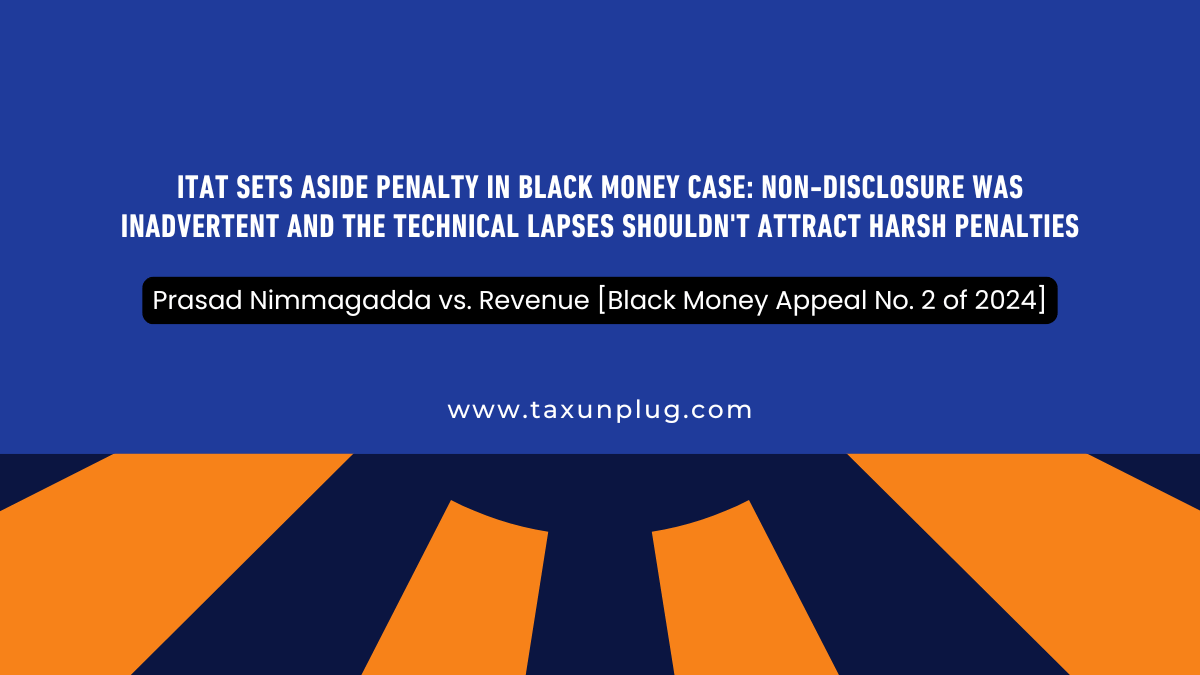ITAT Black Money Penalty:
Prasad Nimmagadda vs. Revenue [Black Money Appeal No. 2 of 2024]
Background of the Case
The appellant, Prasad Nimmagadda filed his ITR but failed to disclose certain foreign assets for the Assessment Year 2017-18. The appellant not disclosed assets included investments in foreign entities and residential properties. The Assessing Officer levied a penalty of Rs. 10 lakh under Section 43 of the Black Money (Undisclosed Foreign Income and Assets) and Imposition of Tax Act, 2015 (BMA Act) for this non-disclosure, which was later upheld by the Commissioner of Income Tax (Appeals). The appellant approached the ITAT Hyderabad, seeking relief on the grounds that the omission was inadvertent and not deliberate.
Arguments by the Appellant
The appellant, contended that the failure to disclose foreign assets in the ITR for AY 2017-18 was an unintentional oversight. He argued that the investments in question had been consistently reported in previous and subsequent years, demonstrating that there was no attempt to conceal information. Additionally, he emphasized that the sources of these investments had been fully explained and accepted by the tax authorities during assessment proceedings, confirming that there was no undisclosed income involved. The appellant further submitted that the stringent provisions of the BMA Act should not be applied mechanically, especially in cases where the taxpayer has acted in good faith and rectified the omission voluntarily.
Respondent’s Response
The respondent, Revenue defended the imposition of the penalty, asserting that Section 43 of the BMA Act mandates strict consequences for non-disclosure of foreign assets, irrespective of the taxpayer’s intent. The respondent argued that the appellant failed to report these assets in the designated Schedule FA of the ITR constituted a clear violation of statutory obligations. The respondent maintained that the Assessing Officer had the discretion to impose penalties in such cases and that the appellant had not provided sufficient evidence to prove that the omission was beyond his control. They emphasized that the BMA Act was enacted to combat black money and that leniency in its application could undermine its effectiveness.
Court Findings and Decision
The ITAT Hyderabad ruled in favor of the appellant, setting aside the penalty. The Tribunal observed that the non-disclosure was a bona fide error, given that the same assets had been consistently reported in other assessment years. It noted that the AO had accepted the legitimacy of the investments during the assessment proceedings, indicating that there was no attempt to evade taxes. The ITAT referenced its earlier decision in Ocean Diving Centre Ltd., where it was held that penalties under the BMA Act should not be levied for inadvertent omissions.
The Tribunal also relied on the Telangana High Court’s judgment in Mylan Laboratories, which underscored the importance of judicial discipline and the need to avoid mechanical application of penalties in cases involving technical breaches.
ITAT Black Money Penalty
To download official order, Click Here
“The site is for information purposes only and does not provide legal advice of any sort. Viewing this site, receipt of information contained on this site, or the transmission of information from or to this site does not constitute an attorney-client relationship. The information on this site is not intended to be a substitute for professional advice.”

